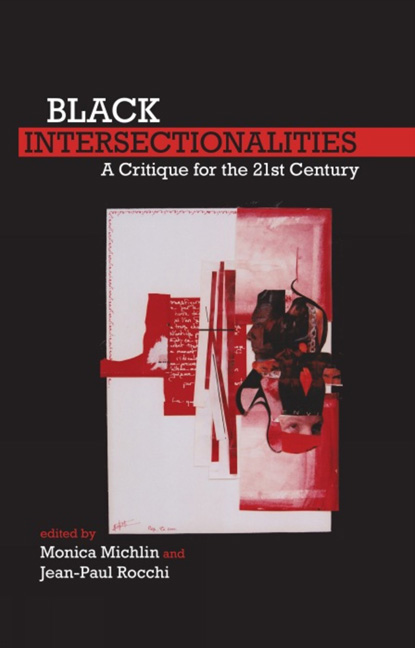Book contents
- Frontmatter
- Contents
- 1 Introduction: Theorizing for Change: Intersections, Transdisciplinarity, and Black Lived Experience
- 2 Exordium: Writing and the Relation: From Textual Coloniality to South African Black Consciousness
- I Challenging Hegemonic Gender Identities
- II Nonconformity and Narrative heorizing
- III Upsurges of Desire
- IV Epistemological Genealogies and Prospections
- 12 On the Monstrous Threat of Reasoned Black Desire
- 13 Revising Jezebel Politics: Toward a New Black Sexual Ethic
- 14 The Challenge of Black Feminist Desire: Abolish Property
- Contributors
- Index
14 - The Challenge of Black Feminist Desire: Abolish Property
from IV - Epistemological Genealogies and Prospections
- Frontmatter
- Contents
- 1 Introduction: Theorizing for Change: Intersections, Transdisciplinarity, and Black Lived Experience
- 2 Exordium: Writing and the Relation: From Textual Coloniality to South African Black Consciousness
- I Challenging Hegemonic Gender Identities
- II Nonconformity and Narrative heorizing
- III Upsurges of Desire
- IV Epistemological Genealogies and Prospections
- 12 On the Monstrous Threat of Reasoned Black Desire
- 13 Revising Jezebel Politics: Toward a New Black Sexual Ethic
- 14 The Challenge of Black Feminist Desire: Abolish Property
- Contributors
- Index
Summary
The following chapter needs to be framed in explicit ways: it reads the theoretical advances of Black Feminism in the United States as an epistemic rupture for, and of, contemporary White Gender Theory. It is not an up-to-date exhaustive and inclusive report of recent Black Feminist activism and scholarship, particularly of the younger, post-Obama, internet-based textual and activist production, in its manifold academic and non-academic articulations. This restriction is due to the particular nature of my enterprise here: to produce a reckoning within the white African American and Gender Studies scholarship of my generation.
For scholars and activists of the middling generation, particularly in Europe, Black Feminism has figured prominently in the controversial debates between African American female post-civil rights movement activist intellectuals and their male opponents, both in the black leftist and Black Nationalist organizations. Alice Walker's anti-patriarchal advances in her short stories and in novels like Meridian (1976), Michelle Wallace's book Black Macho and the Myth of the Superwoman (1979), or Ntozake Shange's play For Colored Girls (1977), met with enthusiastic feminist acclaim, but also scandalized conservative audiences. Those public representations of the struggle of African American women struck back against reactionary white racist and sexist stereotypes, and against black male misogyny cast in the post-Moynihan report mold of unveiled contempt. All of a sudden, black women thinkers and writers, anthologized in collections like Anzaldúa and Moraga's This Bridge Called My Back (1981) or Barbara Smith's Home Girls (1983) had found a powerful public voice, which also made visible the ignorance, indifference, and downright racism of much of the White feminist movement at the time. Epitomized in the landmark compilation All the Women are White, All the Blacks are Men, But Some of Us are Brave (1982), those pioneering controversies and the ensuing black women's studies created productive and lasting responses within the US and European academies and have helped to shape the Collegium for African American Research, its research focuses, and publication output. Even a cursory glance at faculty listings, class syllabuses, web publications, or at Sherri Barnes's stunning multidisciplinary web bibliography “Black American Feminisms” will show that black women have entered the US academy to stay.
- Type
- Chapter
- Information
- Black IntersectionalitiesA Critique for the 21st Century, pp. 211 - 224Publisher: Liverpool University PressPrint publication year: 2013



